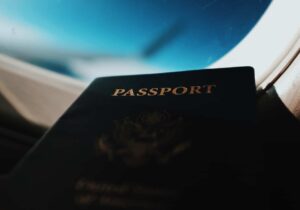The Serbian passport (Pasoš Srbije) serves as the principal travel document for Serbian nationals when traveling internationally. The Serbian Police, acting on behalf of the Ministry of Internal Affairs, handles the issuance and renewal of Serbian passports for citizens residing within the country.
For Serbians living abroad, Serbian Embassies and Consulates take on the responsibility of issuing and renewing passports, ensuring accessibility for Serbian citizens around the world.
Keep reading as we take an in-depth look at Serbian passports, from the advantages of holding one to Serbian law on nationality and obtaining Serbian citizenship and a new passport.
Types of Serbian Passports
Regular passport: Issued to all Serbian citizens.
Diplomatic passport: Granted by the Serbian Ministry of Foreign Affairs, this passport is issued to diplomats, high-ranking officials, members of parliament, and individuals on official state business, including their immediate family members.
Official passport: Shares all characteristics with the diplomatic passport but does not carry the advantages of diplomatic immunity. Issued to mid and low-ranking officials, as well as non-diplomatic staff at embassies and consulates
Emergency travel document: Issued to Serbian citizens facing emergencies or who don’t hold a valid passport and have urgent travel needs. Requests for emergency passports may require proof of emergency, such as a police report, a medical appointment, or funeral arrangements.
Visa and border stamp pages
A standard Serbian passport typically comprises 32 pages designed for visa and border stamps. They feature light colors, predominantly green, red, yellow, and blue, and display the Serbian lesser coat of arms in the center. The passports are perforated the individual serial numbers on the bottom and watermarks within page numbers.
Entry Requirements for Serbian Passport Holders

Concerning global mobility, Serbian passports provide visa free benefits, enhancing global mobility when combined with an existing passport from countries like Canada, the United States, and the United Kingdom. Serbian passports facilitate travel to 148 visa free countries, including China, Russia, and all EU countries.
A Serbian passport is particularly beneficial for visa free and electronic travel authorization (eTA) entry to several countries inaccessible without visas for many tier-one passports. Let’s explore the countries accessible to citizens of the Republic of Serbia.
| Country | Serbia |
|---|---|
 Albania Albania | visa free (90 days) |
 Algeria Algeria | visa required |
 Andorra Andorra | visa free (90 days) |
 Angola Angola | visa required |
 Antigua and Barbuda Antigua and Barbuda | visa free (180 days) |
 Argentina Argentina | visa free (90 days) |
 Armenia Armenia | visa free (180 days) |
 Australia Australia | e-visa |
 Austria Austria | visa free (90 days) |
 Azerbaijan Azerbaijan | e-visa |
 Bahamas Bahamas | e-visa |
 Bahrain Bahrain | e-visa |
 Bangladesh Bangladesh | visa on arrival |
 Barbados Barbados | visa free (90 days) |
 Belarus Belarus | visa free (30 days) |
 Belgium Belgium | visa free (90 days) |
 Belize Belize | visa required |
 Benin Benin | e-visa |
 Bhutan Bhutan | e-visa |
 Bolivia Bolivia | visa on arrival |
 Bosnia and Herzegovina Bosnia and Herzegovina | visa free (90 days) |
 Botswana Botswana | e-visa |
 Brazil Brazil | visa free (90 days) |
 Brunei Brunei | visa required |
 Bulgaria Bulgaria | visa free (90 days) |
 Burkina Faso Burkina Faso | e-visa |
 Burundi Burundi | visa on arrival |
 Cambodia Cambodia | visa on arrival |
 Cameroon Cameroon | e-visa |
 Canada Canada | visa required |
 Cabo Verde Cabo Verde | visa on arrival |
 Central African Republic Central African Republic | visa required |
 Chad Chad | visa required |
 Chile Chile | visa free (90 days) |
 China China | visa free (30 days) |
 Colombia Colombia | visa free (90 days) |
 Comoros Comoros | visa on arrival |
 Congo Congo | visa required |
 DR Congo DR Congo | e-visa |
 Costa Rica Costa Rica | visa free (90 days) |
 Ivory Coast Ivory Coast | e-visa |
 Croatia Croatia | visa free (90 days) |
 Cuba Cuba | visa free (90 days) |
 Cyprus Cyprus | visa free (90 days) |
 Czech Republic Czech Republic | visa free (90 days) |
 Denmark Denmark | visa free (90 days) |
 Djibouti Djibouti | e-visa |
 Dominica Dominica | visa free (21 days) |
 Dominican Republic Dominican Republic | visa free |
 Ecuador Ecuador | visa free (90 days) |
 Egypt Egypt | visa on arrival |
 El Salvador El Salvador | visa required |
 Equatorial Guinea Equatorial Guinea | e-visa |
 Eritrea Eritrea | visa required |
 Estonia Estonia | visa free (90 days) |
 Swaziland Swaziland | visa free (30 days) |
 Ethiopia Ethiopia | e-visa |
 Fiji Fiji | visa free (120 days) |
 Finland Finland | visa free (90 days) |
 France France | visa free (90 days) |
 Gabon Gabon | e-visa |
 Gambia Gambia | visa free (90 days) |
 Georgia Georgia | visa free (360 days) |
 Germany Germany | visa free (90 days) |
 Ghana Ghana | visa required |
 Greece Greece | visa free (90 days) |
 Grenada Grenada | visa free (90 days) |
 Guatemala Guatemala | visa required |
 Guinea Guinea | e-visa |
 Guinea-Bissau Guinea-Bissau | visa on arrival |
 Guyana Guyana | visa required |
 Haiti Haiti | visa free (90 days) |
 Honduras Honduras | visa required |
 Hong Kong Hong Kong | visa free (14 days) |
 Hungary Hungary | visa free (90 days) |
 Iceland Iceland | visa free (90 days) |
 India India | e-visa |
 Indonesia Indonesia | visa on arrival |
 Iran Iran | e-visa |
 Iraq Iraq | visa required |
 Ireland Ireland | visa required |
 Israel Israel | visa free (90 days) |
 Italy Italy | visa free (90 days) |
 Jamaica Jamaica | visa on arrival |
 Japan Japan | visa free (90 days) |
 Jordan Jordan | visa on arrival |
 Kazakhstan Kazakhstan | visa free (30 days) |
 Kenya Kenya | e-visa |
 Kiribati Kiribati | visa required |
 Kosovo Kosovo | visa free (90 days) |
 Kuwait Kuwait | visa on arrival |
 Kyrgyzstan Kyrgyzstan | visa free (90 days) |
 Lao Lao | visa on arrival |
 Latvia Latvia | visa free (90 days) |
 Lebanon Lebanon | visa on arrival |
 Lesotho Lesotho | e-visa |
 Liberia Liberia | visa required |
 Libya Libya | visa required |
 Liechtenstein Liechtenstein | visa free (90 days) |
 Lithuania Lithuania | visa free (90 days) |
 Luxembourg Luxembourg | visa free (90 days) |
 Macao Macao | visa free (90 days) |
 Madagascar Madagascar | visa on arrival |
 Malawi Malawi | e-visa |
 Malaysia Malaysia | e-visa |
 Maldives Maldives | visa on arrival |
 Mali Mali | visa required |
 Malta Malta | visa free (90 days) |
 Marshall Islands Marshall Islands | visa required |
 Mauritania Mauritania | visa on arrival |
 Mauritius Mauritius | visa on arrival |
 Mexico Mexico | visa required |
 Micronesia Micronesia | visa free (30 days) |
 Moldova Moldova | visa free (90 days) |
 Monaco Monaco | visa free (90 days) |
 Mongolia Mongolia | visa free (90 days) |
 Montenegro Montenegro | visa free (90 days) |
 Morocco Morocco | visa required |
 Mozambique Mozambique | visa on arrival |
 Myanmar Myanmar | e-visa |
 Namibia Namibia | visa required |
 Nauru Nauru | visa required |
 Nepal Nepal | visa on arrival |
 Netherlands Netherlands | visa free (90 days) |
 New Zealand New Zealand | visa required |
 Nicaragua Nicaragua | visa on arrival |
 Niger Niger | visa required |
 Nigeria Nigeria | e-visa |
 North Korea North Korea | visa required |
 North Macedonia North Macedonia | visa free (90 days) |
 Norway Norway | visa free (90 days) |
 Oman Oman | visa on arrival |
 Pakistan Pakistan | e-visa |
 Palau Palau | visa on arrival |
 Palestine Palestine | visa free |
 Panama Panama | visa free (90 days) |
 Papua New Guinea Papua New Guinea | visa required |
 Paraguay Paraguay | visa required |
 Peru Peru | visa free (90 days) |
 Philippines Philippines | visa required |
 Poland Poland | visa free (90 days) |
 Portugal Portugal | visa free (90 days) |
 Qatar Qatar | visa on arrival |
 Romania Romania | visa free (90 days) |
 Russia Russia | visa free (30 days) |
 Rwanda Rwanda | visa on arrival |
 Saint Kitts and Nevis Saint Kitts and Nevis | e-visa |
 Saint Lucia Saint Lucia | visa required |
 Samoa Samoa | visa on arrival |
 San Marino San Marino | visa free (90 days) |
 Sao Tome and Principe Sao Tome and Principe | e-visa |
 Saudi Arabia Saudi Arabia | visa required |
 Senegal Senegal | visa required |
 Seychelles Seychelles | visa free (90 days) |
 Sierra Leone Sierra Leone | e-visa |
 Singapore Singapore | visa free (30 days) |
 Slovakia Slovakia | visa free (90 days) |
 Slovenia Slovenia | visa free (90 days) |
 Solomon Islands Solomon Islands | visa required |
 Somalia Somalia | visa on arrival |
 South Africa South Africa | visa required |
 South Korea South Korea | e-visa |
 South Sudan South Sudan | e-visa |
 Spain Spain | visa free (90 days) |
 Sri Lanka Sri Lanka | e-visa |
 Saint Vincent and the Grenadines Saint Vincent and the Grenadines | visa free (90 days) |
 Sudan Sudan | visa required |
 Suriname Suriname | visa free (30 days) |
 Sweden Sweden | visa free (90 days) |
 Switzerland Switzerland | visa free (90 days) |
 Syria Syria | visa required |
 Taiwan Taiwan | visa required |
 Tajikistan Tajikistan | e-visa |
 Tanzania Tanzania | visa on arrival |
 Thailand Thailand | e-visa |
 Timor-Leste Timor-Leste | visa on arrival |
 Togo Togo | visa on arrival |
 Tonga Tonga | visa required |
 Trinidad and Tobago Trinidad and Tobago | visa free (30 days) |
 Tunisia Tunisia | visa required |
 Turkmenistan Turkmenistan | visa required |
 Tuvalu Tuvalu | visa on arrival |
 Turkey Turkey | visa free (90 days) |
 Uganda Uganda | e-visa |
 Ukraine Ukraine | visa free (30 days) |
 United Arab Emirates United Arab Emirates | visa free (90 days) |
 United Kingdom United Kingdom | visa required |
 United States United States | visa required |
 Uruguay Uruguay | visa free (90 days) |
 Uzbekistan Uzbekistan | visa free (30 days) |
 Vanuatu Vanuatu | visa free (30 days) |
 Vatican Vatican | visa free (90 days) |
 Venezuela Venezuela | visa required |
 Vietnam Vietnam | e-visa |
 Yemen Yemen | visa required |
 Zambia Zambia | visa free (90 days) |
 Zimbabwe Zimbabwe | visa on arrival |
 Afghanistan Afghanistan | visa required |
Serbia Passport Benefits
A foreign national who becomes a Serbian citizen and acquires a valid travel document from the Republic secures a plan B and new opportunities for themself and their family members.
Serbia passport power highlights:
Stable economy: Serbia is gaining increasing attention from foreign investors seeking a foothold in the European market due to its long history of economic stability. Serbia passport holders can conduct business in a stable country that has proved its resilience against challenging economic conditions.
Enhanced global mobility: A valid passport from the Republic of Serbia provides access to 148 visa free countries. Serbian passport holders can access the Schengen Area visa free for 90 days out of 180 days, as well as strict countries such as Russia and China. Additionally, a valid Serbian identity card allows access to six countries in the region, including Albania, Montenegro, and Turkey.
Free healthcare system: The Serbian government provides free universal healthcare to all citizens, including doctor visits, hospital stays, and various healthcare services. Private health insurance is also available at low premiums.
Well-developed infrastructure: Despite Serbia’s low cost of living and relatively small economy, the country has well-developed infrastructure. Major cities such as Belgrade, Novi Sad, and Kragujevac boast modern public transportation networks, including highways and railways that connect major cities, facilitating efficient travel and trade. Robust telecommunications and internet services further contribute to Serbia’s advanced infrastructure.
Serbia passport ranking
Serbia’s passport ranks in the top third of other global passports. According to the Global Passport Index, the Serbian passport is the 65th strongest passport worldwide when considering global mobility, investment opportunities, and quality of life factors.
Serbia Passport Cost

Qualifying investments include real estate acquisition and business investments, and upon completing a qualifying investment and passing due diligence checks, a three-year residence permit is issued. After three years of residence, a foreign citizen can apply for permanent residency, and an additional three years of residency provides eligibility for the issuance of Serbian citizenship by naturalization and a Serbian passport.
A significant benefit of investing in the Republic of Serbia to gain a residence permit and create a path to Serbian citizenship is there is no minimum investment required, meaning a prospective applicant can purchase property or establish businesses of any value and qualify for the program.
The fee to obtain a Serbian biometric passport in Serbia is RSD 3600 (about $34). Passports issued by a Serbian Embassy or Consular office typically cost between $70 and $80.
Serbia Passport Requirements
The Ministry of Internal Affairs of the Republic of Serbia is the government division handling Serbian citizenship applications and Serbian passports. The required documents include:
- A passport application form
- Identification document (old passport, Serbian national identity card, or other official documents proving one’s identity)
- Original certificate of Serbian citizenship no more than 12 months old (only required for issuance of the first biometric passport)
- Serbian birth certificate (if applicable)
- Marriage certificates (if applicable)
Serbian travel documents for children
Additional information, steps, and documents are required when applying for a child’s travel document in the Republic of Serbia. The following documents and steps needed include:
- Both parents must appear in person to submit a minor child’s passport application.
- Applications submitted by a sole parent must include certified written consent from the absent parent.
- Applications for travel documents for children with a foreign parent must include written consent or a statement of compliance.
Eligibility Criteria for a Serbian Passport
Acquiring a Serbian biometric passport is a simple process, as long as you meet the eligibility requirements and successfully fulfill due diligence checks. You can qualify for a Serbia passport as a foreign resident within six years.
The following individuals are eligible to obtain Serbian citizenship:

- Persons born in the Republic of Serbia who have lived in the country for at least two years.
Citizenship by descent
- Persons whose parents were Serbia citizens at the time of their birth.
- Persons born in the Republic of Serbia who had at least one Serbian parent at the time of their birth.
- Persons born abroad who had at least one Serbian parent at the time of their birth and the other parent was unknown or a foreign citizen, and the person chose to request citizenship at the age of 23.
Citizenship by marriage
- Foreign spouses of Serbian nationals who have been married for at least three years and hold permanent residence status.
Citizenship by naturalization
- Foreign residents who obtain permanent residency after three years residency and live in Serbia for at least six years.
Citizenship by exception
- Individuals recognized for their substantial contributions to the Republic of Serbia through contributions to education, business, or who have substantial assets held in the Republic.
Serbian citizenship by birthright
A standard method of acquiring citizenship for Serbians is by jus soli through Serbian ancestry. A person born in the Republic of Serbia can request citizenship after living in the country for two years.
Serbian citizenship by descent
The most predominant method natural-born Serbians acquire citizenship is through jus sanguinis. An individual can be granted citizenship by descent in the following three specific circumstances:
- Both parents were Serbian citizens at the time of their birth.
- They were born in Serbia, and at least one parent was a Serbian citizen at the time of their birth.
- At least one parent was a Serbian citizen at the time of their birth, and the other parent was unknown or a foreign national, and the person chooses to request citizenship at 23 years old.
Serbian citizenship by marriage
Foreigners married to a Serbian national are eligible for citizenship, provided they have been married for three years and hold permanent residence status in the Republic.
Serbian citizenship by naturalization
The Republic of Serbia has a six-year naturalization process. This requires three years of residence before being eligible to apply for permanent residency and an additional three years with permanent residence status.
How to get a Serbian passport by investment
Serbia’s residency by investment provides a path to citizenship of the Republic and a Serbian travel document after six years of residency.

- Be at least 18
- Hold a clean criminal record
- Make one of two investments: Purchase a property anywhere in Serbia or establish a Serbian business
- Submit your application to the Ministry of Internal Affairs of the Republic of Serbia and obtain your investment visa
- Complete three years of residency and apply for permanent residency
- Complete an additional three months of residency with permanent residence status and no more than six months outside the country each year.
- Submit your citizenship application and the necessary documents to the Ministry of Internal Affairs of the Republic of Serbia along with the required documentation
- Await approval
- Upon receipt of your Serbian citizenship certificate, you can apply for a Serbian passport with the Ministry of Internal Affairs of the Republic of Serbia
An advantage of the Serbian naturalization process is there is no requirement to prove knowledge of Serbian culture, language, or customs to be naturalized.
Kosovan citizens
As per Serbian legislation, individuals born in Kosovo or those with legal residence in Kosovo are automatically recognized as Serbian nationals. Consequently, they possess the legal right to obtain a Serbian passport. However, passports go through a separate issuing process.
The Directorate of the Administrative Affairs of the Serbian Police does not issue Serbian passports to Kosovans and Kosovo residents; instead, they’re issued by the Coordination Directorate for Kosovo and Metohija of the Serbian Ministry of Internal Affairs.
Processing Time for Serbia Passport Applications
How long it takes to process a Serbia passport largely depends on whether you applied through the Ministry of Internal Affairs in Serbia or overseas at a Serbian Embassy or Consulate. Passport applications submitted to the Ministry of Internal Affairs have a processing time of 60 days.
Applications submitted at a consular office overseas may take slightly longer, depending on the office and country.
Serbian Dual Citizenship
The government of Serbia previously required natural-born Serbians and foreign nationals to renounce their citizenship before acquiring Serbian citizenship or a foreign nationality. However, Serbia’s new citizenship law allows dual citizenship for all Serbian citizens.
Validity Period of Serbian Passports
The Serbia passport validity period for adults and children over 14 is ten years. Serbian passports have a total of three validity periods, depending on the age of the applicant.
Applicant's Age | Validity Period |
0 to 2 years old | Three years |
3 to 13 years old | Five years |
14 years old and above | Ten years |
Serbia passport renewal
Renewing a Serbian travel document follows the same process as applying for a new passport. This involves submitting a passport application to the Ministry of Internal Affairs and requesting an in-person appointment to receive a new passport. Overseas applications must be submitted to the nearest Serbian Embassy or Consulate.
If applying for a lost or stolen passport, applicants must obtain a police report from their local police station.
Serbia residency requirements
Applicants of Serbia’s citizenship by investment program must prove a minimum of 183 days of residency in the country before being eligible for citizenship of the Republic after six years. However, Serbian citizenship law doesn’t require language proficiency or knowledge of the country’s history and customs.
Is a Serbian passport worth having?
Enhance international travel options for yourself and your family, embrace a more affordable lifestyle, or retire in a picturesque destination – a Serbian biometric passport is a valuable asset.
For a detailed discussion about your second passport options, our expert consultants in investment migration are ready to assist you today.
Whether you are considering Serbia’s investment program or Caribbean economic citizenship programs, like St Kitts and Nevis citizenship by investment, our tailored approach guarantees thorough guidance through every stage of the process.
Experience a host of privileges with a Serbia passport, such as:
- A stable economic environment and low investment requirements for residency
- 148 visa free countries, including Russia, China, and European Union countries
- Potential EU citizenship and an EU passport in the near future
- Serbians can to several countries in the region with a national identity card, including Bosnia and Herzegovina, Montenegro, and Turkey
Frequently Asked Questions about Serbian Passport
Can an American get a Serbian passport?
US citizens seeking a foreign citizenship can get a passport from the Republic of Serbia if they obtain Serbian citizenship by birth through Serbian ancestry, marriage to a Serbian national, naturalization, or investment.
Can a Serbian have dual citizenship in the USA?
Both the United States and Serbia allow dual citizenship, meaning an adult or child can hold dual citizenship in both countries.
How strong is the Serbia passport?
According to the Global Passport Index, the Serbia passport occupies the 65th position regarding passport power. The Serbia passport ranking relative most other countries is high. 148 visa free countries are accessible for Serbia passport holders, countries in the Schengen Area, Russia, South Korea, and China.
How can I get a Serbia passport?
If you already have Serbian citizenship, you must apply for a passport through the Ministry of Internal Affairs in Serbia or the Serbian Embassy or Consulate if you are in another country. If you are not a Serbian citizen, you must go through the process of acquiring citizenship of the Republic, which includes birthright, descent, marriage, or naturalization.
If you hold no birthright or family claims to citizenship, you can acquire a Serbian biometric passport after six years of residency (the last three with permanent residence. The naturalization process does not require knowledge of Serbian culture or language.
Can you travel visa free with a Serbian second passport to more than 130 countries?
Holders of a second passport from Serbia have access to 148 visa free and visa on arrival countries, including China, Russia, and all countries in the European Union.
Is the Serbia passport biometric?
New passports issued in Serbia contain biometric information. Biometric passports were introduced in Serbia on 1 July 2008.
How powerful is a Serbia passport?
The Serbia passport ranking relative to most other global passports is high. It ranks in the top third of the world’s passport in terms of strength. According to the Global Passport Index, it ranks 47th out of 197 countries. As a potentially new EU member state, and offering passport-free access to several neighboring countries, Serbia’s passport offers significant advantages regarding global mobility.
How many countries can you visit with a Serbia passport?
According to Global Citizen Solutions’ Global Passport Index, a Serbian passport currently ranks 65th in the world. It provides visa free entry, including electronic travel authorization, to 148 destinations. Serbia passport visa free countries include China, Russia, and EU countries, making it highly attractive for foreign nationals.
Additionally, Serbians can travel to several neighboring countries without visas or passports by using their national identity card, including:
- Albania
- Bosnia and Herzegovina
- Kosovo
- Montenegro
- North Macedonia
- Turkey
How many passports does Serbia allow?
The Serbian government allows dual citizenship, and there is no statement or entry in Serbian law on nationality implying the number of passports Serbian passport holders can have. This means Serbia passport holders can legally hold multiple passports.
Is it easy to get a Serbia passport?
Obtaining a Serbian passport is a relatively simple process. Provided you fulfill the residency requirement, including six years of legal residency (the last three with permanent residency) and have no stays of more than six months outside the country each year, you can acquire citizenship of the Republic and a passport.
How to renew a Serbian passport in the USA?
Serbia passport holders can renew their passport or replace a damage, lost or stolen existing passport in the United States by contacting their nearest Serbian Consulate or Embassy. These include:
- Serbia Embassy in Washington
- Serbia Honorary Consulate in Cleveland
- Serbia Honorary Consulate in Denver
- Serbia Honorary Consulate in Los Angeles
- Serbia Honorary Consulate in Montana
They must submit their expired Serbian passport, proof of residence in the USA, and passport-size photos. Schedule an appointment if required. Pay the applicable fee using the accepted payment methods. Wait for the processing period and collect the new passport once it’s ready.



